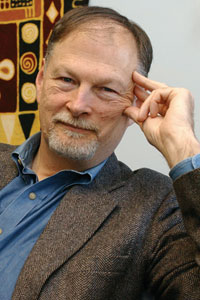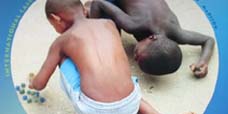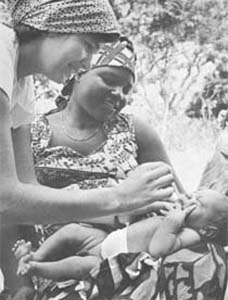
On a trip to Ethiopia in 1986, James McCann was puzzled: the country’s agricultural landscape had been transformed since he first visited as a Peace Corps volunteer in the early 1970s. "Everyone was planting maize,” says the CAS and GRS history professor. “Maize is the most drought-prone crop one could grow.”
Professor’s African findings show continent in agricultural turmoil
By Abigail Klingbeil
Photo by Vernon Doucette
On a trip to Ethiopia in 1986, James McCann was puzzled: the country’s agricultural landscape had been transformed since he first visited as a Peace Corps volunteer in the early 1970s.
“Everyone was planting maize,” says the CAS and GRS history professor. “Maize is the most drought-prone crop one could grow.” It also yields lower prices than other crops and isn’t part of the traditional Ethiopian diet. Even so, corn had in the past century supplanted many traditional African crops, such as sorghum, millet, and rice.
McCann’s new book, Maize and Grace: Africa’s Encounter with a New World Crop 1500–2000, forthcoming from Harvard University Press, explores how maize has emerged as a major food crop throughout eastern and southern Africa in recent decades. It also poses tough questions about maize’s impact on the continent, including its link to increased incidences of malaria.
First introduced to Africa by trans-Atlantic and Pacific Ocean trade in the early 1500s, maize took off among Africans in the 20th century, McCann says. Zambian farmers, for example, increased their production by 400 percent from the early 1960s to the late 1980s. Its new popularity was fueled in part by African government programs that pushed the crop because it requires relatively little labor and little time to grow.
When McCann began exploring the crop’s rise, he says, he was “antimaize.” But his position became more balanced as he examined the social and political reasons farmers chose to grow maize, and how it benefits many communities.
“In Africa, rice historically has grown only in certain places,” McCann says. “Maize, meanwhile, can be grown in more areas than any other crop.” He also found that as the political situation in Africa became more turbulent, the low-maintenance crop increased in popularity because it could be depended on even if, for example, family members were pulled off their land to fight or work on government projects.
Unintended consequences
James McCann Photo by Vernon Doucette
James McCann Photo by Vernon Doucette
In 2000, McCann revisited the area where he had lived during his two years with the Peace Corps, the Burie district of Gojjam in northwestern Ethiopia. Maize had become the crop of choice in the area, which also was experiencing a malaria epidemic.
Upon his return to the United States, McCann met malaria expert Andrew Spielman, a Harvard University professor of tropical public health, and their conversations launched McCann on a new area of research — the relationship between malaria and maize farming. “No one had ever connected these two at any time,” says McCann, who dedicates a chapter in Maize and Grace to the topic. “It’s science that comes out of unexpected associations.”
McCann is fluent in Amharic, Ethiopia’s national language, and he received a Fulbright-Hays Faculty Research Abroad Fellowship to conduct fieldwork on the phenomena in the Burie district. During 2002 and 2003, he interviewed farmers and visited health centers to talk to people with malaria. And he worked closely with Ethiopian Ministry of Health epidemiologist Asnakew Kebede, a mosquito expert, to determine the precise malaria infection rate among maize farmers.
An Ethiopian colleague of Kebede had found that the larvae of the mosquito that carries malaria had a survival rate of 93 percent when it fed on maize pollen, as opposed to a survival rate of about 13 percent when it fed on other possible food sources. Furthermore, adult mosquitoes raised on maize pollen had uncharacteristically large wingspans and long life spans.
Needed: alternatives
At a small hotel in Burie, McCann and Kebede propped up a laptop on a bed and analyzed their data. They found that maize farmers were more than nine times as likely to develop malaria as other farmers. “That was the Eureka moment,” McCann says.
A study based on the findings, authored by McCann, Kebede, Ethiopian scientist Yemane Yeebiyo, and Anthony Kiszewski, an instructor at the Harvard School of Public Health, will be published in an upcoming issue of the American Journal of Tropical Medicine and Hygiene.
McCann, in collaboration with the African Studies Center, the School of Public Health, and the Harvard School of Public Health, at present is seeking additional funding to expand the research.
“To me, the pinnacle of what a historian can do is pull together all sorts of things and make sense of them and look at them as they change over time,” says McCann, who directed the African Studies Center until last fall. He has written two previous books about Africa: People of the Plow: An Agricultural History of Ethiopia, 1900–1990 and Green Land, Brown Land, Black Land: An Environmental History of Africa, 1800–1990.
McCann no longer describes himself as “antimaize,” but he does not believe that the crop is going to lead to a green revolution in Africa, as many economists predicted in the mid-1990s. He says that governments, including that of the United States, must do more to provide agricultural choices for African farmers to prevent overdependence on the crop. And he is encouraged that agricultural companies are developing more drought-resistant maize.
McCann says scientists and the public must better understand the plant. “Maize, in the year 2020,” he says, “will be the number one crop in the world.”









